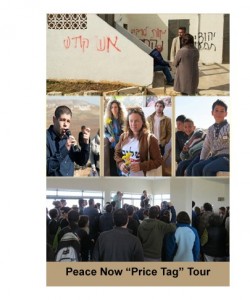
Israel’s Peace Now movement took more than 150 Israelis to the West Bank Friday on a first-of-its-kind tour to
learn about the extremist settlers’ violent campaign known as “Price Tag.”
Participants viewed Israeli military installations and Palestinian villages that are routinely vandalized by
extremist settlers. Tour participants paid a solidarity visit to one of the Palestinian villages that has been
a target of choice for the violent settlers, the village of Kusra near Nablus, where residents received them with
flowers.

Peace Now has been taking Israelis to the West Bank for years to show them up close what the occupation is
doing to Palestinians and to their own society. Recently, because of the uptick in settler violence and because of
the re-energized peace talks, Peace Now decided to boost this program by adding topical tours. Last week it was a
tour to explore the “Price Tag” phenomenon. In the coming weeks Peace Now is planning tours to other trouble spots,
featuring other maladies of the occupation.
These tours are expensive, but critically important.
Please support this program. You can help Peace Now expose the occupation to
Israelis.
 A contribution of $50 will sponsor two seats on the bus. For
$100 you can send four Israelis for a day in the West Bank, and open their eyes to what their government
does there in their name, and to what the settlers are doing to the Palestinians and to the future of the
state of Israel. Join us now.
A contribution of $50 will sponsor two seats on the bus. For
$100 you can send four Israelis for a day in the West Bank, and open their eyes to what their government
does there in their name, and to what the settlers are doing to the Palestinians and to the future of the
state of Israel. Join us now.
B'Shalom,
Debra DeLee
President and CEO, Americans for Peace Now




